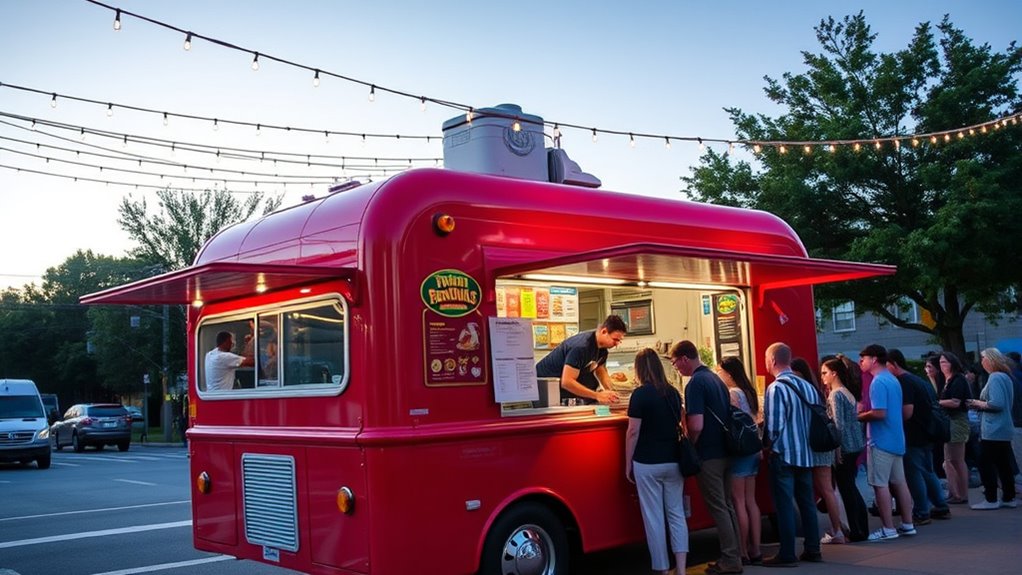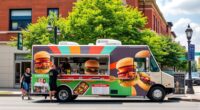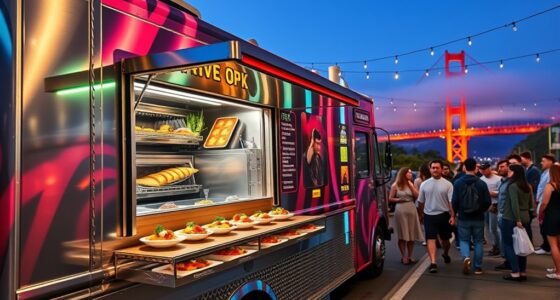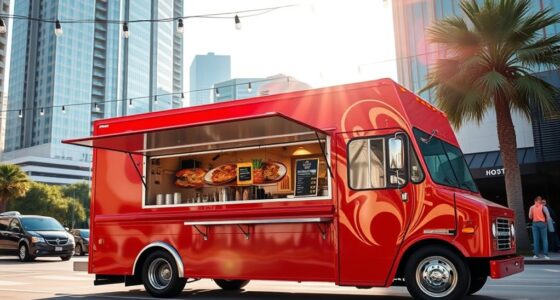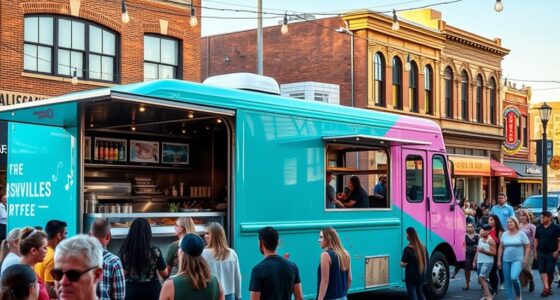Starting a food truck in Irving, TX, involves understanding local regulations, securing necessary permits online, and choosing approved vending zones. Develop a solid business plan, budget for equipment and permits, and explore financing options like loans or grants. Design a unique menu, set competitive prices, and invest in marketing to attract customers. Keep compliance and sanitation standards in check. If you focus on these steps, you’ll be well on your way—more tips await as you explore further.
Key Takeaways
- Obtain necessary permits and licenses through Irving’s online portals, ensuring compliance with health, safety, and zoning regulations.
- Choose compliant vending zones and familiarize yourself with local restrictions on operating hours and location.
- Develop a strong brand with effective food truck branding, social media marketing, and unique menu offerings to attract customers.
- Budget for vehicle customization, kitchen equipment, permits, and insurance to ensure smooth startup operations.
- Build customer loyalty with friendly service, social media engagement, loyalty programs, and offering authentic, innovative menu items.
Local Food Scene Overview
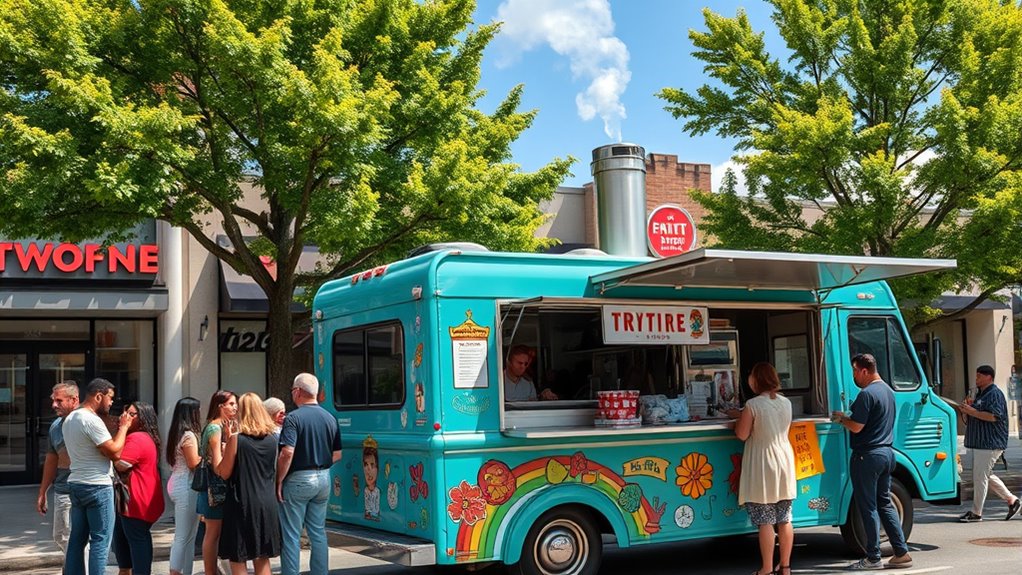
Irving’s food scene is thriving, blending diverse cuisines and innovative concepts to create a vibrant culinary landscape. As a food truck owner, you’ll find that effective food truck branding is key to standing out. Develop a memorable identity that resonates with locals and visitors alike, making your truck instantly recognizable. Engaging your customers through social media, unique menu items, and friendly service keeps them coming back. Customer engagement goes beyond just serving food; it’s about creating an experience that builds loyalty. Irving’s residents appreciate creativity and quality, so focus on delivering authentic flavors and a strong brand presence. By understanding the local vibe and actively connecting with your audience, you’ll carve out a successful niche in this dynamic food scene. Additionally, fostering a sense of self-awareness regarding your brand and customer preferences can help you adapt and grow more effectively.
Understanding Local Requirements
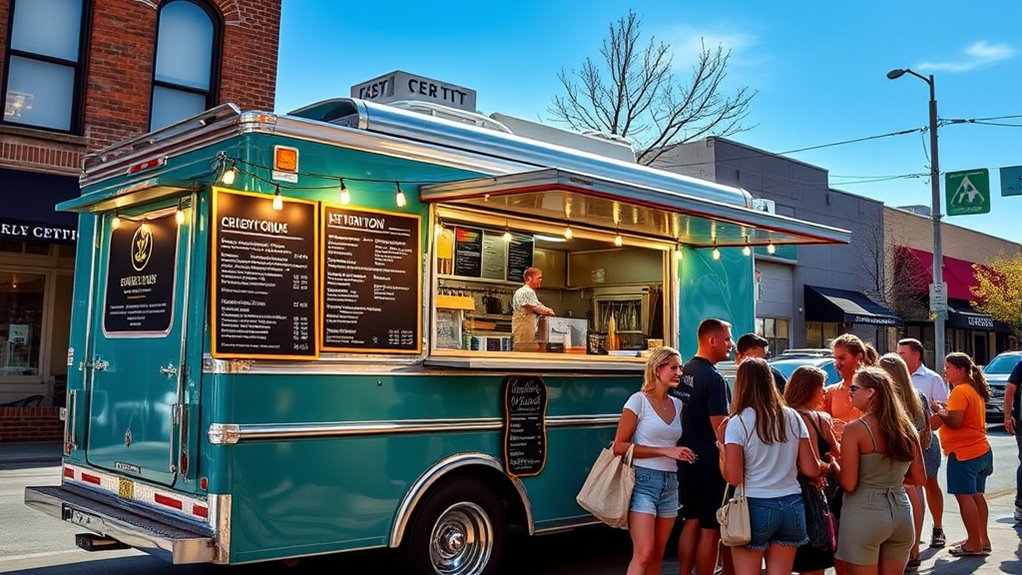
To get started, you’ll want to explore the online permit application portals, which facilitate the process of obtaining necessary approvals. You also need to meet local sanitation standards and provide proper documentation to stay compliant. Additionally, understanding designated street vending zones ensures you choose the right locations for your food truck. Incorporating knowledge of local health regulations and food safety practices can help prevent violations and ensure a smooth operation.
Online Permit Application Portals
Managing the permit application process for food trucks has become easier with online portals that streamline submissions and track progress. These application portals allow you to apply for online permits quickly without visiting city offices in person. By using the online permit application portals, you can submit all required documents and pay fees through a centralized system, saving time and reducing errors. Most local jurisdictions, including Irving, provide clear instructions on their websites, making it easier to understand specific requirements. Tracking your application status is also straightforward, so you stay informed at every stage. Using these online permits ensures your application is complete and submitted correctly, helping you avoid delays and move forward with starting your food truck business efficiently.
Sanitation Standards and Documentation
Are you aware of the specific sanitation standards required for operating a food truck in Irving, TX? Ensuring your truck meets local health codes starts with understanding handwashing protocols, which mandate proper hand hygiene stations and regular practices. You’ll need to maintain detailed documentation of sanitation procedures, including cleaning schedules and pest control logs. Regular sanitation inspections are conducted by health officials to verify compliance, so being prepared is essential. Keep your food prep and service areas spotless and follow all guidelines for temperature control and equipment cleanliness. Staying compliant not only prevents health violations but also builds customer trust. Make sure your documentation is up-to-date and accessible during inspections to demonstrate your commitment to food safety standards in Irving.
Designated Street Vending Zones
Understanding the designated street vending zones in Irving, TX is essential for legal and successful operation. Local street vending regulations specify where you can park your food truck, making it vital to identify approved food truck parking areas. These zones are designated to ensure the safety of pedestrians and traffic flow, and operating outside them can lead to fines or shutdowns. Before setting up, check with city officials or the Irving city website to find approved vending zones and any restrictions on hours or proximity to other businesses. Complying with street vending regulations not only keeps your business legal but also helps build a positive reputation. Always verify zone status regularly, as these zones can change with city updates or special events.
Setting Up Your Base of Operations
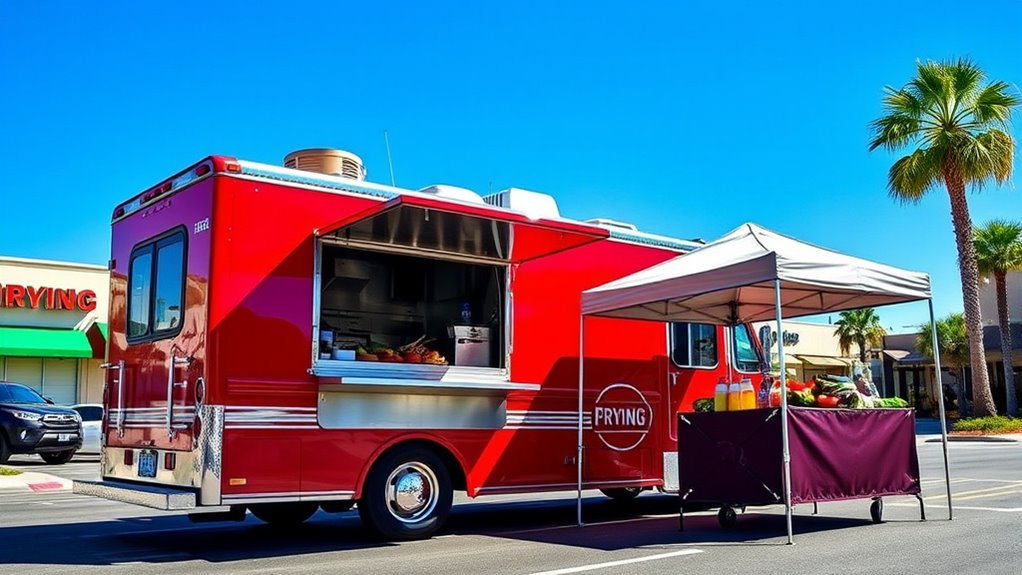
When setting up your base of operations, you’ll need to consider shared kitchen licensing requirements to stay compliant with local health codes. Selecting the right custom kitchen equipment is vital for efficient food prep and service. Make sure your setup meets all regulations and suits your menu to keep your food truck running smoothly. Incorporating versatile kitchen tools can enhance your efficiency and help you achieve a professional-quality operation.
Shared Kitchen Licensing Requirements
Setting up your food truck’s base of operations often involves obtaining the appropriate shared kitchen license, which guarantees your facility meets health and safety standards. To do this, you’ll need to secure shared kitchen licensing from local health authorities, demonstrating your compliance documentation. This licensing ensures your space adheres to sanitation, food handling, and safety regulations, preventing future legal issues. You’ll likely need to provide proof of sanitation procedures, equipment maintenance, and staff training. The licensing process may include inspections and review of your compliance documentation to verify your facility’s readiness. Remember, having the correct shared kitchen license is essential for legal operation and building trust with customers, so don’t skip this important step in setting up your Irving food truck.
Custom Kitchen Equipment Selection
Are you ready to choose the right custom kitchen equipment for your food truck? Selecting the right cooking appliances and storage solutions is vital for efficiency. Consider compact, multi-use appliances like combo ovens and induction cooktops to maximize space. Proper storage keeps ingredients fresh and organized, streamlining your workflow. Here’s a quick look at some essential equipment:
| Cooking Appliance | Storage Solutions | Space Considerations |
|---|---|---|
| Commercial griddle | Under-counter shelves | Fits tight corners |
| Deep fryers | Insulated food containers | Easy access for prep |
| Sandwich presses | Adjustable racks | Optimizes limited space |
Choosing the right equipment helps you serve quality food swiftly, making your Irving food truck a success.
Budgeting and Financing Your Food Truck
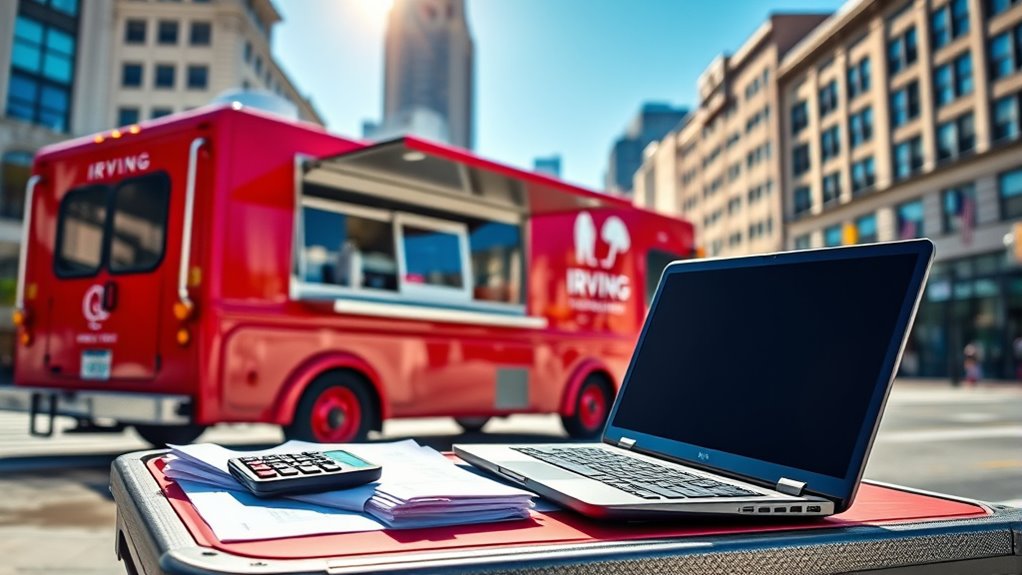
To get your food truck off the ground, you need to plan for initial vehicle modifications and understand the costs involved. You should also explore local financing options to fund your venture and guarantee you’re covered with adequate liability insurance. Knowing these key points helps you create a realistic budget and secure the necessary funds to start strong. Additionally, consider researching vetted safety products to ensure your truck meets health and safety standards from the outset.
Initial Vehicle Modification Costs
When budgeting for your food truck, one of the most significant expenses you’ll face is the initial vehicle modification costs. Vehicle customization is essential to turn your truck into a fully functional kitchen, which includes installing cooking equipment, refrigeration, and electrical systems. These modifications can vary widely depending on your menu and design preferences. Additionally, paint job costs are a key part of vehicle customization, affecting both aesthetics and branding. A high-quality paint job can cost anywhere from a few thousand dollars to over ten thousand, depending on the complexity and finish. Planning for these expenses upfront guarantees you allocate enough funds for essential modifications, helping you avoid surprises and stay within your overall budget. Properly budgeting for vehicle customization sets a strong foundation for your food truck’s success.
Local Food Truck Financing Sources
Securing financing for your food truck can come from a variety of local sources, each offering different advantages suited to your needs. Local banks and credit unions often provide small business loans tailored to entrepreneurs, making them a dependable option. Some local lenders may also offer specialized financing programs for food truck startups, especially if you have a solid business plan. Additionally, community development agencies sometimes provide grants or low-interest loans for new food truck ventures, especially if you plan to obtain necessary food truck permits and operate in underserved areas. Crowdfunding platforms can also be an effective way to raise capital, connecting you with local supporters. Exploring these local financing options helps guarantee you have the funds to cover vehicle costs, permits, and initial operations.
Liability Insurance for Food Trucks
Liability insurance is a critical expense to contemplate when budgeting for your food truck, as it protects you from costly claims and legal issues. Having proper food truck liability insurance coverage ensures you’re protected if someone gets injured or if there’s property damage during your operations. Without it, a single accident could lead to significant financial burdens. When selecting insurance coverage, focus on policies that address food truck liability specifically, including coverage for bodily injury, property damage, and product liability. This insurance not only safeguards your assets but also builds trust with customers and vendors. Remember, many venues and events require proof of insurance, so obtaining the right coverage is essential for smooth operations and peace of mind.
Designing Your Menu and Pricing Strategy
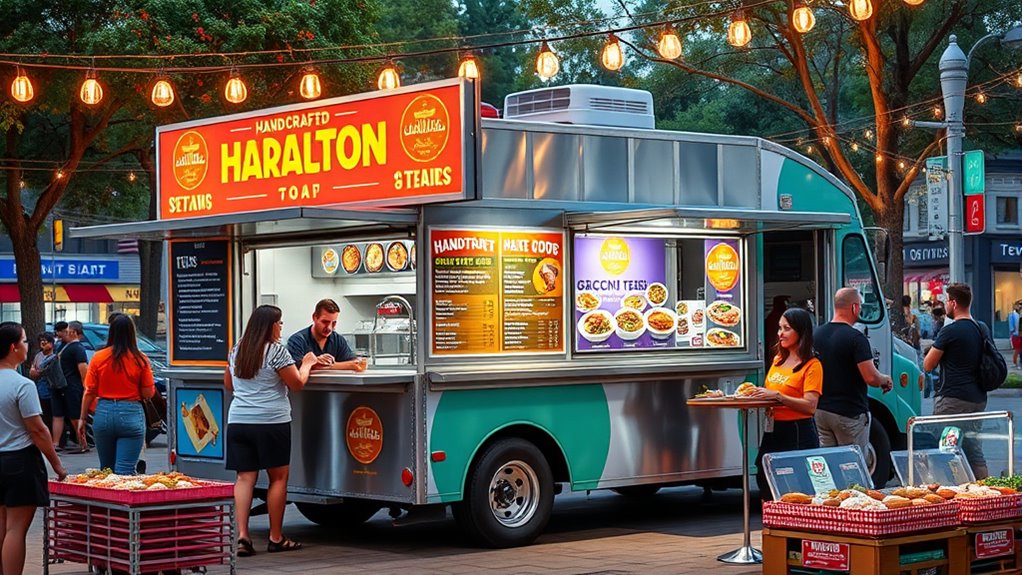
When designing your menu, consider sourcing unique ingredients that set you apart while keeping costs manageable. Adjust portion sizes strategically to control expenses without sacrificing quality. These approaches help you create an appealing menu that balances flavor and profitability. Incorporating innovative flavors and toppings can attract more customers and keep your offerings exciting.
Unique Ingredient Sourcing Strategies
| Local Farmers | Sustainable Suppliers | Urban Foraging |
|---|---|---|
| Fresh & seasonal | Eco-friendly packaging | Wild herbs & greens |
| Direct relationship | Fair trade practices | Neighborhood spots |
| Cost-effective | Long-term partnerships | Unique ingredients |
Cost Control Through Portion Adjustments
After securing fresh, locally sourced ingredients through sustainable suppliers and urban foraging, it’s important to manage your food costs effectively. One of the best ways to do this is by implementing portion control. By standardizing portion sizes, you prevent over-serving and reduce waste, which directly translates to cost savings. Consistent portions help you accurately price your menu items, ensuring profitability without sacrificing quality. Additionally, portion control allows you to monitor ingredient usage closely, making it easier to identify areas where you can cut costs. It also simplifies inventory management, reducing spoilage and excess stock. Overall, controlling portions is a simple yet powerful strategy to keep your food truck’s expenses in check while maintaining customer satisfaction.
Technology and Operations
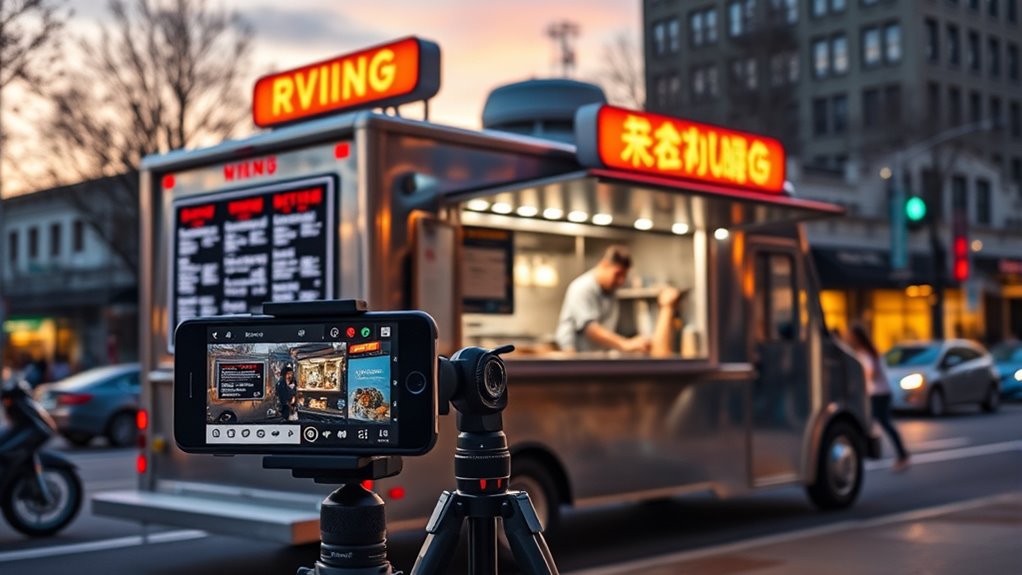
Using wireless card readers lets you accept payments on the go without hassle. Mobile POS systems streamline order management and speed up service, keeping your operations smooth. Plus, stock tracking tools help you stay on top of inventory, so you never run out of popular items.
Wireless Card Readers for Mobility
Wireless card readers have revolutionized how food trucks operate by enabling seamless, on-the-go payment processing. With wireless card readers, you can accept payments anytime and anywhere, making transactions quick and efficient for your customers. These devices are an essential part of mobile payment solutions, providing flexibility and speed that traditional cash registers just can’t match. You no longer need to be tied to a physical cash drawer or a fixed point-of-sale system, which means you can serve more customers in less time. Wireless card readers also improve customer satisfaction by reducing wait times and offering multiple payment options. Investing in reliable mobile payment solutions helps streamline your operations and keeps your food truck competitive in Irving’s bustling food scene.
Mobile POS and Stock Tracking
A mobile POS system combined with stock tracking tools can transform your food truck operations by providing real-time sales data and inventory management at your fingertips. With a reliable mobile POS, you can quickly process orders, accept multiple payment methods, and track sales instantly. Stock tracking features help you monitor inventory levels, identify popular items, and prevent stockouts. Visualize your operations with this snapshot:
| Aspect | Benefit |
|---|---|
| Mobile POS | Faster transactions, improved efficiency |
| Stock Tracking | Accurate inventory, reduced waste |
| Data Insights | Better sales strategies |
| Real-time Updates | Immediate stock adjustments |
| Customer Service | Faster service, higher satisfaction |
This combination streamlines your workflow, boosts sales, and keeps your inventory organized.
Marketing and Growing Your Presence
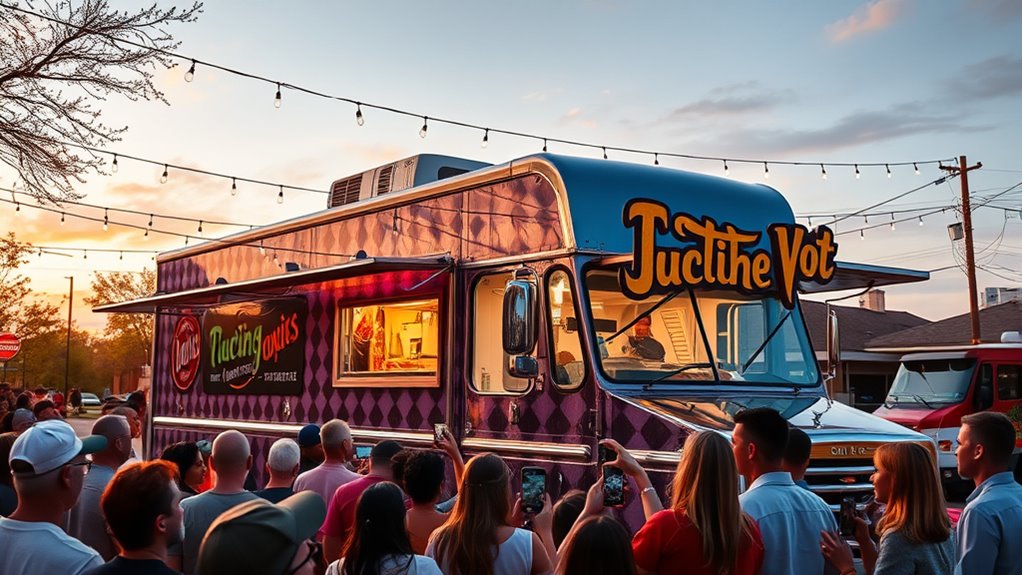
To grow your food truck’s presence, focus on consistent weekly event scheduling to attract regular customers. Implementing customer loyalty programs can encourage repeat business and boost word-of-mouth promotion. By combining these strategies, you’ll create a stronger connection with your community and expand your reach effectively.
Weekly Event Scheduling Tips
Consistent weekly event scheduling is essential for building your food truck’s reputation and attracting repeat customers in Irving, TX. To succeed, plan your weekly schedule well in advance, choosing popular locations and times that suit your target audience. Use effective event coordination tips, such as confirming details with event organizers and preparing your menu accordingly. Keep communication clear with partners and vendors to avoid last-minute surprises. Promote your upcoming appearances on social media and local event calendars to maximize visibility. Stick to a regular schedule so customers know when to find you. This consistency helps establish your food truck as a reliable option, boosts word-of-mouth referrals, and creates a loyal customer base enthusiastic to return.
Customer Loyalty Programs
Have you considered how a well-designed customer loyalty program can markedly boost your food truck’s presence in Irving, TX? Implementing customer rewards through loyalty cards encourages repeat business and helps you build a loyal customer base. With loyalty cards, customers earn points or discounts with each purchase, motivating them to choose your truck over competitors. You can also offer special rewards for frequent visits or referral bonuses, increasing word-of-mouth promotion. These programs make customers feel appreciated and valued, which strengthens their connection to your brand. Keep the rewards simple, attractive, and easy to redeem. By actively promoting your loyalty program at each event, you’ll foster stronger relationships and ensure your food truck remains top of mind for hungry Irving residents.
Navigating Irving’s Food Truck Regulations
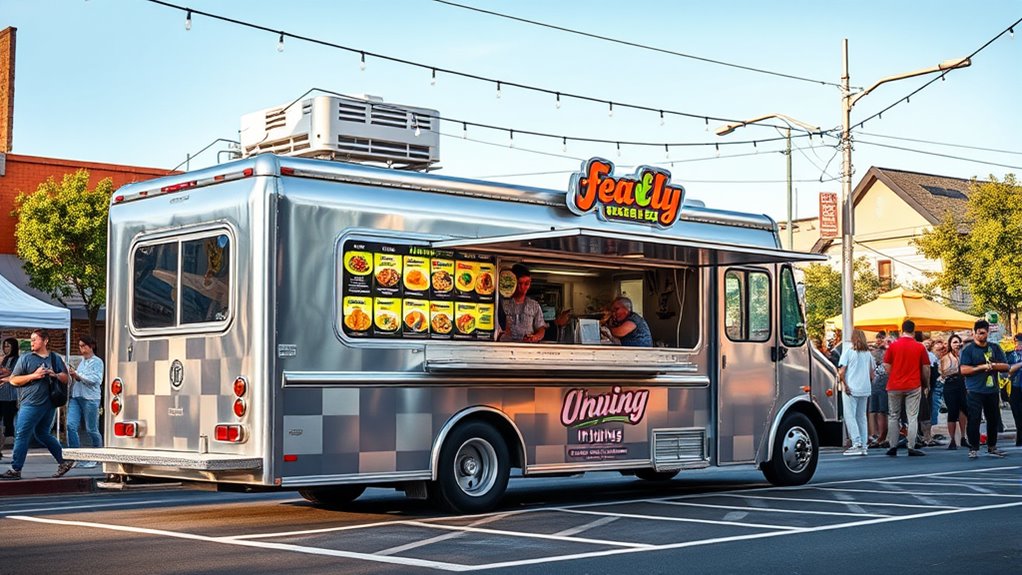
Getting through Irving’s food truck regulations requires understanding local rules that vary from other cities. You’ll need to obtain the proper food truck permits to operate legally in the area. These permits ensure your truck meets health, safety, and zoning standards. Irving designates specific vendor zones where trucks can park and serve customers, so it’s essential to familiarize yourself with these locations to avoid penalties. You may also need to apply for additional licenses or pass health inspections before opening. Staying compliant means regularly checking for updates on regulations, as city rules can change. By securing the right permits and understanding vendor zones, you’ll set a strong foundation for your food truck business in Irving.
Frequently Asked Questions
What Permits Are Required for Food Trucks in Irving, TX?
You’ll need to obtain food truck licensing and comply with mobile vending regulations to operate legally in Irving, TX. First, apply for a Texas Food Establishment Permit through the Texas Department of State Health Services. You’ll also need a mobile food vendor permit from the city. Make sure to meet health and safety standards, pass inspections, and secure any additional local permits required for vending in Irving’s public spaces.
How Can I Find the Best Locations for My Food Truck?
To find the best locations for your food truck, focus on parking hotspots with high customer foot traffic. Visit busy areas like popular parks, event venues, and office districts during peak hours. Use social media to spot local events and gather feedback from potential customers. Observe where other food trucks succeed, and consider partnering with nearby businesses. This strategic approach guarantees you attract more customers and maximize your sales.
What Insurance Coverage Is Mandatory for Food Trucks in Irving?
Imagine you’re running your food truck when an accident occurs. In Irving, TX, you need to meet insurance requirements, including liability coverage, to protect yourself and others. Mandatory insurance coverage typically includes general liability insurance, which covers injuries and property damage, and vehicle insurance specific to your truck. Having these safeguards guarantees you’re compliant with local regulations and prepared for unexpected incidents, giving you peace of mind while serving delicious food.
Are There Any Health Inspection Standards Specific to Irving?
In Irving, you must follow specific health inspection standards that emphasize food safety protocols and sanitation standards. You’re required to maintain cleanliness, proper food handling, and temperature controls. The local health department conducts regular inspections to ensure compliance. Make sure your food truck adheres to these standards to pass inspections smoothly, protect your customers, and avoid penalties. Staying updated on Irving’s health regulations helps keep your food truck operation compliant and successful.
How Do I Hire and Train Staff for My Food Truck?
You should start by recruiting reliable staff through local job boards or networking. For example, a food truck owner in Irving successfully used a structured training program focused on customer service and safety, which improved team performance. Focus on staff management by clearly defining roles, expectations, and ongoing training programs. Conduct hands-on training sessions to guarantee your team comprehends food prep, hygiene, and customer interactions, helping your truck run smoothly and efficiently.
Conclusion
Starting a food truck in Irving, TX, is an exciting venture with great potential. Did you know Irving’s food scene attracts over 3 million visitors annually? By understanding local regulations, crafting a unique menu, and leveraging marketing strategies, you can tap into this vibrant market. With careful planning and dedication, your food truck can thrive in Irving’s dynamic culinary landscape and become a favorite among residents and visitors alike.
